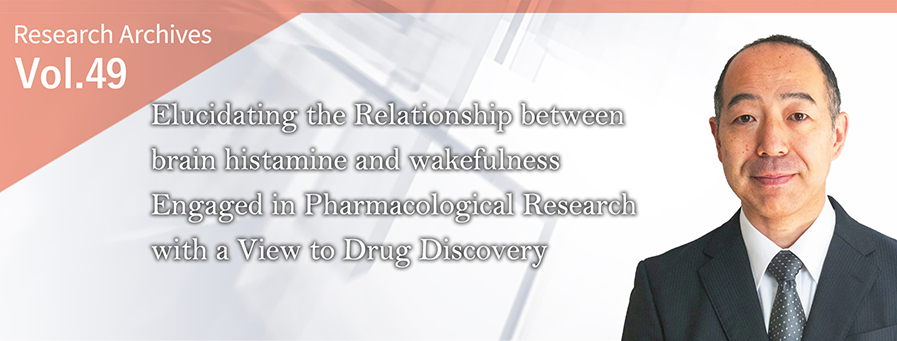
Department of Neuropharmacology, Graduate School of Medicine, Hokkaido University
YOSHIKAWA Takeo M.D., Ph.D.Physiological Science
- [Academic & Professional Experience]
-
- Apr. 1996–Mar. 2002: School of Medicine, Tohoku University
- Apr. 2002–Mar. 2004: Resident, OHTANISHINOUCHI Hospital
- Apr. 2004–Mar. 2008: Graduate School, Division of Medical Sciences, Tohoku University
- Apr. 2009–Mar. 2016: Assistant Professor, Graduate School of Medicine, Tohoku University
- Apr. 2016–Apr. 2023: Associate Professor, Graduate School of Medicine, Tohoku University
- May 2023–Present: Professor, Graduate School of Medicine, Department of Neuropharmacology,Hokkaido University
- Oct. 2023-Present: Faculty member, Research and Education Center for Brain Science, Hokkaido University
Pharmacological research focused on the mechanism of histamine removal in the brain
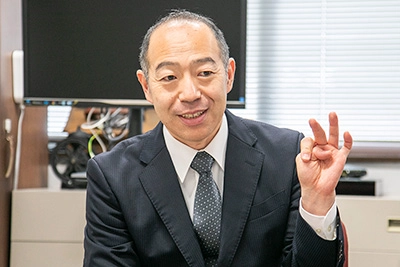
The Department of Neuropharmacology was established in 1922 as the Department of Pharmacology, and it now has a rich history of over 100 years. Professor Takeo Yoshikawa was appointed as the sixth professor of the department in 2023. He conducts pharmacological research and education and investigates neural mechanisms in the brain.
Professor Yoshikawa says, “In addition to basic research to elucidate neural mechanisms in the brain, it is also important to conduct research and development that will benefit human health as part of the mission of the School of Medicine. We are engaged in research that will lead to prevention, diagnosis, treatment, and drug discovery through pharmacological approaches.”
His three main research themes are (1) research on the neural system for the control of sleep-wake cycles, (2) drug development for hypersomnia, and (3) research on autism spectrum disorders. Studies on (1) and (2) focus on histamine and neuropeptides to elucidate the functions of neural mechanisms that control sleep and wakefulness. Histamine is widely known as a physiologically active substance involved in allergic reactions and gastric acid secretion, but it also functions as a neurotransmitter in the brain and shows strong arousing effects. However, further investigation is required to elucidate its impact on neural circuits that controls arousal and sleep. Similarly, the roles of neuropeptides such as neurotensin in brain function are not yet fully understood. The department is working to elucidate the entire sleep-wake mechanism using various genetically engineered animals, genetic manipulation using adeno-associated viruses, optogenetics, fiber photometry, and other techniques.
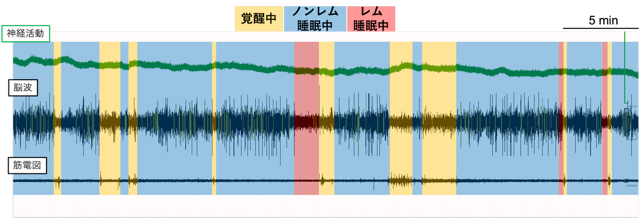
With previous studies, Professor Yoshikawa has shown that histamine N-methyltransferase (HNMT), which degrades histamine, plays an important role in the regulation of histamine levels in the brain. Since HNMT is an enzyme that reduces the histamine levels in the brain, he hypothesizes that HNMT inhibitors could improve hypersomnia disorders. “Using compound libraries, we are currently screening compounds that inhibit HNMT,” Professor Yoshikawa says. “This research is expected to be useful in the treatment of hypersomnia disorders such as narcolepsy and idiopathic hypersomnia.
The histaminergic nervous system also seems to be associated with aggressive and violent behavior in mammals, and many central nervous system disorders including schizophrenia, bipolar disorder, autism spectrum disorder, Alzheimer's disease, and depression. The department is also conducting research to elucidate the pathophysiology of these central nervous system diseases and to develop new drugs based on the findings.
[1] ^ REM/NREM sleep
During REM sleep, the brain is actively working while sleeping, and the eyeballs move under closed eyelids. In NREM sleep, on the other hand, eye movements are not observed
Elucidating the function of the nervous system for the treatment of hypersomnia
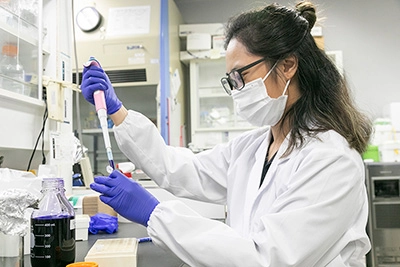
Ms. Anne Bernadette Agu, an international student from the Philippines, has been working under Professor Yoshikawa to elucidate the relationship between histamine in the brain and HNMT. She says, “I am conducting research related to HNMT for the treatment of hypersomnia. The goal is to find compounds that act only on the brain without affecting other parts of the human body. It would be great if I could discover inhibitors that specifically act on HNMT and lead to a cure.”
Histamine is not the only brain substance involved in sleep and wakefulness. At this department the focus is on neuropeptides, and particular attention is given to neurotensin, galanin, and melanin-concentrating hormone. Neurotensin, galanin, and melanin-concentrating hormone are also thought to be substances involved in sleep and wakefulness, but there are many aspects of their actions that are still unknown. Clear demonstration of these functions will help to elucidate new mechanisms that regulate sleep and wakefulness, and will be applied to the treatment of insomnia, hypersomnia, and even neurodegenerative diseases.
“Hypersomnia, including narcolepsy, is a serious condition that reduces quality of life, and the market for therapeutic drugs is expanding significantly worldwide. Our research results are highly anticipated as a contribution to this situation,” says Professor Yoshikawa.
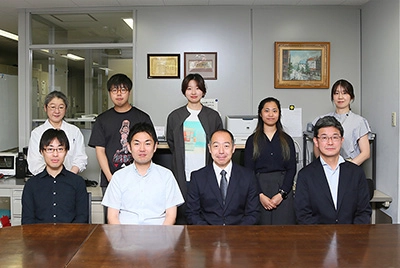
The department is staffed by Professor Yoshikawa, two lecturers, one assistant professor, one administrative assistant, one technical assistant, two doctoral students, and two master’s students. Educational strategies include role-playing and other active learning techniques, and simulation training sessions with the use of virtual reality (VR) goggles are offered to high school students. Study sessions include a weekly article reading session in English and a pharmacology textbook reading session for undergraduates. The English pharmacology textbook reading session began in September.
Professor Yoshikawa says, “Since there are abundant opportunities for exposure to English, I would like graduate students to take any opportunity to make a presentation overseas and to participate in short-term study abroad. We also support undergraduate students studying abroad. This year, one of our third-year medical students studied abroad in San Diego, USA.” Professor Yoshikawa encourages students to broaden their horizons overseas while enjoying their daily research activities.
(Interviewed in July 2024)
Research environment that respects independence
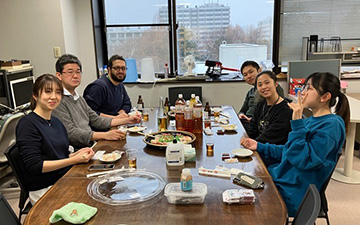
The feature of this department is that unique individuals from Japan and abroad can communicate freely with each other. The environment allows students to view medical research from a wide range of perspectives, not limited to the nervous system and importance is placed on respecting students’ independence and encouraging them to develop an attitude of independent inquiry.
One of the international students is from the Philippines, and the other is from Turkey. Both are good cooks, and they sometimes prepare dishes from their home countries for dinner parties. Professor Yoshikawa and Lecturer Fumito Naganuma, who both previously worked at a university in Miyagi Prefecture, are planning to hold a party to enjoy imoni (stewed potatoes), a local dish of Miyagi Prefecture.


